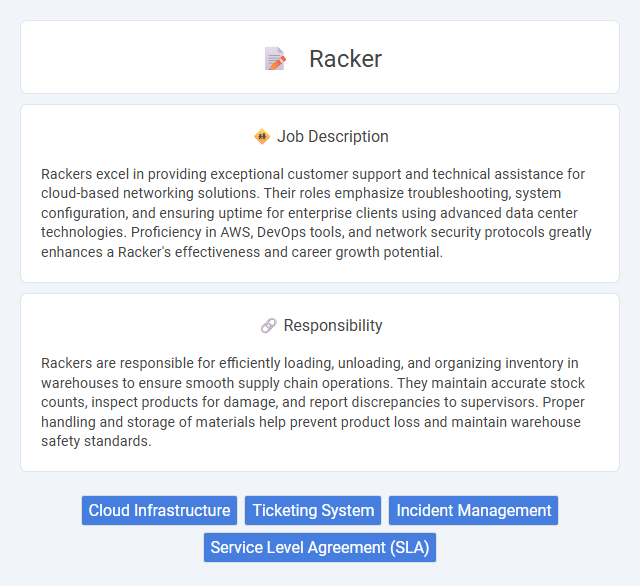
Rackers excel in providing exceptional customer support and technical assistance for cloud-based networking solutions. Their roles emphasize troubleshooting, system configuration, and ensuring uptime for enterprise clients using advanced data center technologies. Proficiency in AWS, DevOps tools, and network security protocols greatly enhances a Racker's effectiveness and career growth potential.
Individuals with strong physical stamina and attention to detail are likely to be well-suited for a racker job, as it often involves repetitive tasks and precise handling of materials in a fast-paced environment. Those who have good organizational skills and can maintain focus during manual labor may find greater success and job satisfaction in this role. People prone to fatigue or lacking patience might face challenges adapting to the physical and mental demands required by racker positions.
Qualification
Racker job positions demand strong technical skills in networking, Linux systems, and cloud technologies such as AWS or Azure. Candidates should possess relevant certifications like CompTIA Network+, CCNA, or AWS Certified Solutions Architect to demonstrate expertise. Proven experience in troubleshooting, system administration, and automation using tools like Ansible or Terraform is highly valued by employers.
Responsibility
Rackers are responsible for efficiently loading, unloading, and organizing inventory in warehouses to ensure smooth supply chain operations. They maintain accurate stock counts, inspect products for damage, and report discrepancies to supervisors. Proper handling and storage of materials help prevent product loss and maintain warehouse safety standards.
Benefit
Working as a racker likely offers benefits such as a steady income and opportunities for skill development in warehouse operations. High demand in logistics and supply chain industries may increase job stability and advancement prospects. Health benefits and flexible work schedules could further enhance overall job satisfaction.
Challenge
Working as a racker likely involves navigating complex warehouse environments where accuracy and speed are crucial, presenting a continuous challenge in maintaining efficiency. The role may frequently demand quick problem-solving skills to handle unexpected inventory discrepancies or equipment issues. It is probable that adapting to varying workloads and tight deadlines further tests a racker's ability to perform reliably under pressure.
Career Advancement
Racker offers diverse career advancement opportunities through structured training programs and leadership development initiatives designed to enhance employee skills in IT, customer service, and management roles. The company fosters a supportive environment that promotes internal mobility and recognizes high performance, allowing employees to climb the career ladder efficiently. Employees benefit from access to cutting-edge technologies and mentorship networks that accelerate professional growth within the telecommunications and IT service sectors.
Key Terms
Cloud Infrastructure
Racker roles specialize in managing and optimizing cloud infrastructure to ensure scalable, secure, and high-performance environments. Responsibilities include automating deployment processes, monitoring cloud resources, and implementing best practices for virtualization and containerization. Expertise in AWS, Azure, or Google Cloud Platform is essential for driving effective cloud strategy and infrastructure management.
Ticketing System
Racker job roles frequently involve managing ticketing systems designed to efficiently track and resolve customer support requests. These systems prioritize issue categorization, escalation protocols, and real-time updates to enhance communication between technical teams and clients. Mastery of platforms like Jira Service Management or Zendesk is essential for optimizing workflow and ensuring timely resolution of support tickets.
Incident Management
Racker professionals specialize in Incident Management by promptly identifying, analyzing, and resolving service disruptions to minimize downtime and impact on customers. They utilize advanced monitoring tools and standardized protocols to ensure efficient incident response, root cause analysis, and communication across technical teams. Proactive incident resolution strategies employed by Rackers enhance system reliability and customer satisfaction in dynamic IT environments.
Service Level Agreement (SLA)
Racker specializes in managing and optimizing Service Level Agreements (SLAs) to ensure consistent and reliable IT service delivery. Their expertise includes monitoring performance metrics, enforcing SLA compliance, and resolving service disruptions promptly to maintain uptime commitments. By aligning SLA objectives with business goals, Rackers help organizations achieve operational excellence and customer satisfaction.
 kuljobs.com
kuljobs.com